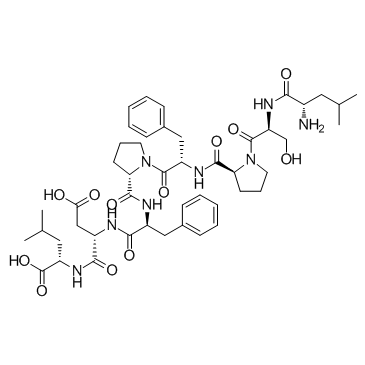p2Ca |
| Katalog-Nr.GC31861 |
p2Ca, ein 8-mer-Peptid, ist ein Ligand, der natÜrlich prozessiert und dem Ld-alloreaktiven T-Zellklon 2C prÄsentiert wird.
Products are for research use only. Not for human use. We do not sell to patients.

Cas No.: 142606-55-1
Sample solution is provided at 25 µL, 10mM.
p2Ca, an 8-mer peptide, is a ligand that is naturally processed and presented to the Ld-alloreactive T cell clone, 2C.
p2Ca and QL9 peptides assume distinct conformations when bind to Ld and, furthermore, demonstrate that there is flexibility in peptide binding within the MHC class I cleft. Ld antigenic peptide p2Ca (LSPFPFDL) is 8-mer that lack the proline at position 2 and thus use alternative amino-terminal anchors. The p2Ca octamer is identified as the ligand that is naturally processed and presented to the Ld-alloreactive T cell clone, 2C[1]. p2Ca, is immunodominant in allorecognition of the murine MHC class I molecule H-2Ld. The majority of Ld-alloreactive T-cell clones are specific for Ld-p2Ca and this immunodominance is not due to peptide cross-reactivity[2]. p2Ca is a ubiquitously expressed self-peptide. p2Ca is derived from the mouse mitochondrial enzyme α-ketoglutarate dehydrogenase. p2Ca is present in every tissue of BALB/c mice that has been examined, including the spleen and thymus. It is also expressed by mouse tumor cell lines such as the mastocytoma P815. CTL derived in vitro recognize specifically the p2Ca/L d complex and use Vβ8 regions predominantly. The cultured cells lyse target cells with lower levels of p2Ca than the levels used for induction. This result suggests that it may be possible to use peptides at high concentrations to elicit CTL that react with endogenous levels of a peptide/class I complex[3].
BALB/c mice, coinjected with a syngeneic BALB/c myeloma and exogenous p2Ca, are able to reject the tumor. The p2Ca/L d system may thus provide a model for evaluating the parameters for effective immunotherapy with tumor-associated peptides[3].
[1]. Hornell TM, et al. Peptide length variants p2Ca and QL9 present distinct conformations to L(d)-specific T cells. J Immunol. 2001 Oct 15;167(8):4207-14. [2]. Connolly JM, et al. The peptide p2Ca is immunodominant in allorecognition of Ld by beta chain variable region V beta 8+ but not V beta 8- strains. Proc Natl Acad Sci U S A. 1994 Nov 22;91(24):11482-6. [3]. Tjoa BA, et al. Generation of cytotoxic T-lymphocytes to a self-peptide/class I complex: a model for peptide-mediated tumor rejection. Cancer Res. 1994 Jan 1;54(1):204-8.
Average Rating: 5 (Based on Reviews and 4 reference(s) in Google Scholar.)
GLPBIO products are for RESEARCH USE ONLY. Please make sure your review or question is research based.
Required fields are marked with *




















